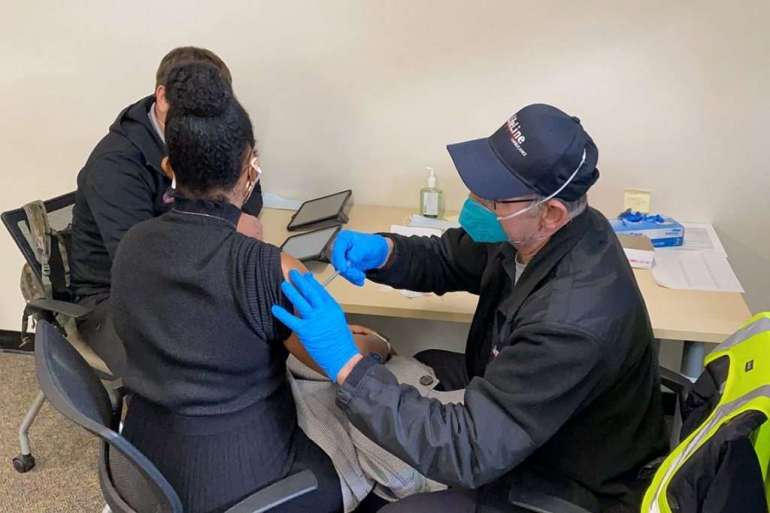Biden team weighs return to mask mandates in some states

The high-level conversations underscore the extent to which the administration is working to find new and more efficient ways to safeguard Americans living in communities with rising infection rates.
But officials are split on the merits of issuing new federal guidelines, with some fearing they will be politicized and embolden new Republican attacks. This camp believes recommending proof of vaccination would raise the specter of “vaccine passports” — an increasingly potent conservative talking point — and alienate and stigmatize portions of the country where individuals have chosen not to get the shot. And they fear calls to reimpose mask mandates will be futile.
“It’s political,” one of the people said. “They think people like [Florida Gov. Ron] DeSantis and company are just waiting for the White House to announce some kind of vaccine mandate and then they’re going to jump on it for political reasons.”
Some of the medical officials on the White House Covid team who’ve been pushing for measures like vaccine verification believe they could provide a jolt to the nation’s lagging immunization effort and, at the very least, press state and local officials to consider reverting to some of the strict public health measures that helped slow the spread of Covid-19 earlier in the pandemic.
Participants at Sunday’s meeting said asking states and jurisdictions to implement strict masking guidelines and social distancing recommendations would be politically easier than taking a public stand on whether to produce proof people have been vaccinated, even if it means rolling back previous masking talking points.
The White House declined to comment about the meeting. The Washington Post was first to report last week that the administration was actively considering again recommending Americans wear masks.
Biden health officials inside the Centers for Disease Control and Prevention have for weeks discussed issuing new vaccination guidelines for Americans, including recommending proof of vaccination and reimposing mask mandates. They’ve been trying to gather data on the Delta variant to help support those policy decisions, one senior administration official with direct knowledge of the matter said.
“The federal government could play a role without actually being the entity that does the vaccine verification and I wish the administration would take that on, more forcefully, saying, not that they’re going to do the passports but that they’re going to enable private companies to do it well,” said Ashish Jha, dean of the school of public health at Brown University.
But officials have shied away from reversing guidelines on masking, claiming a return to mask mandates could potentially confuse Americans and sow more distrust with conservative, rural communities. The administration has also largely pushed back against the idea of formally recommending proof of vaccination, fearful of the political consequences and accusations of discrimination.
“In the vaccine hesitant group, if they had to sign a form today, because they were told today you must be vaccinated today, they would exempt out,” said Michael Osterholm, director of the Center for Infectious Disease Research and Policy at the University of Minnesota and an epidemiologist who served on Biden’s coronavirus advisory board during the presidential transition. “We may be our own worst enemy in terms of trying to get this group vaccinated.”
The Department of Veterans Affairs announced Monday it would impose a vaccine requirement on frontline health workers. Several hospitals and medical associations endorsed similar policies earlier in the day.
The vaccination requirement marked an abrupt shift for an administration that had long dismissed the prospect of federal mandates over worries it would damage confidence in the vaccines and harden opposition.
During a briefing on Friday, White House press secretary Jen Psaki said it was “not the role of the federal government” to require people to take the shots.
But three days later, and as caseloads hit levels not seen since May, Psaki struck a different tone.
“It is certainly prudent for the federal government to be looking at any steps,” she said on Monday, shortly before the VA rolled out its mandate.
Georges Benjamin, head of the American Public Health Association, said he expects the VA to be the first of several agencies to impose mandates, including the Department of Defense. But he said he doesn’t expect the White House to go further by requiring that all federal workers be vaccinated. “Then you just went into conflict with all the governors who have said, ‘Nope, not in my state,’” he said. “And then the debate becomes, not how you vaccinate people, but over the politics of it.”
Front-facing VA health workers will have eight weeks to get fully vaccinated. The move dovetailed with a fresh effort among private-sector health groups to urge vaccinations of health care workers organized by Ezekiel Emanuel, a Biden ally and former member of the Covid-19 team that advised the Biden transition.
In an interview, Emanuel said that he had made his support for mandating vaccinations “well known” within the White House — though his work with the health industry on the issue was not coordinated with the administration.
“We’ve done everything we can,” he said of Biden’s vaccination drive. “What else can be done other than a mandate?”
The private-sector effort came together over the last two weeks, and since going public he said additional health organizations have asked to sign on.
“When you’ve got 57 health care organizations that never agree on anything to all step up, you know you’ve hit something that’s common to them all,” he said.